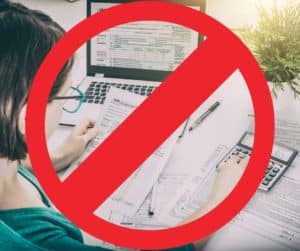Home Loans for Self-Employed Without Tax Returns!
What is a Bank Statement Loan for Self Employed Borrowers?
Find Out if You Qualify for a No-Tax-Return Loan!
What is the Best Loan for Self-Employed People?
Ideal for The Self-Employed
There are ways that a self-employed individual can qualify for conventional and FHA mortgages as Fannie Mae has relaxed the qualifiers for approval on some conventional mortgages and FHA loans have made rules more broad to include the self-employed.
Which Bank Statement Loan is Best?
The answer to this question really depends upon your individual personal job details and your specific financial status. Most often, a bank statement loan provides the least path of resistance and number of hoops to jump through when it comes to providing proof of income to be able to get final approval for a mortgage loan. Of course, it is always best to shop around for your best mortgage option.
How Can You Purchase a Home Without Using Tax Returns?
Though the majority of mortgage loan products require your tax return information to be submitted for the underwriting process, there are many loans out there not sold on the secondary market that use other means of verifying income. Most of these are bank statements loans.
What is a Bank Statement Loan for Self Employed Borrowers?
A bank statement loan for those who are self-employed can be referred to as a few other names including a NON-QM loan or a portfolio loan. These loans are not eligible to become traditional conforming loans (most common loan given to average borrowers) because they do not meet standards set by Fannie Mae and Freddie Mac to be sold and bought by these federal mortgage entities.
These loans stay with the lender that originates them. As such lenders are able to set a wider number of qualifications. Many bank statement loans allow a self-employed borrower to apply for a mortgage without having to submit proof of net income through tax returns or pay stubs. Instead, income is verified through a requested amount of monthly bank statements.

[ninja_form id=1]
How Can You Purchase a Home Without Using Tax Returns?

With most bank statement loans a borrower can supply a set amount of bank statements over a specifically requested time period set by the lender. For these types of loans, an applicant can supply personal bank statements, business bank statements, a combination of bank statements from any account that will be drawn from to pay the mortgage, or with the use of Profit and Loss Statements.
Showing Ability to Repay a Loan Using Bank Statements
As a result of the housing market crash of 2008, The Ability to Repay Rule was put in place for all lenders when originating (creating a new loan) a loan.
This rule states that the lender is responsible to make sure that the borrower can cover the loan payments by verifying income and existing debt. They must add together the borrower’s existing debt obligations and the new mortgage payments and ensure they do not go above a certain percentage of the borrower’s current verified income.
With a bank statement loan, a lender will request anywhere from 12 to 24 months of bank statements for them to look over and verify a steady income in the monetary amount that meets the percentage from the Ability to Repay Rule.
For more information on bank statement loans and all loan options for self-employed borrowers in Mission Viejo and California, please contact me at any time.
Find Out More About Self-Employed Bank Statement and Stated Income Loans
10 Types of Borrowers Categorized as Self-Employed
For some mortgage borrowers, providing a monthly income calculation is not as black and white as it is for others. Those who perform freelance work, own a business, or independently contract out their work are considered as part of the “self-employed” set of borrowers...
New Mortgage Requirements for Self-Employed Borrowers
Last month Fannie Mae and Freddie Mac both announced new standard requirements for self-employed borrowers and loan applicants. It is expected that many other lenders will adhere to these loan requirements in the near future as well. New Self-employment Mortgage...
Obtain a Mortgage When You are Newly Self-Employed
Being self-employed is exciting, and adventurous as well as challenging. You can set your own hours and decide your own income. You have the satisfaction of building something that is all your own instead of building something for someone else. Obtain a Mortgage When...
Difference Between Bank Statement Loans and Stated Income
I am very passionate about this type of home loans for the self-employed. I've been working with several lenders for multiple years now on bank statement loans and stated incomes but is there really a difference? I did a post that bank statement loans are the new...
Stated Income Loans are Ideal for Real Estate Investors
Stated income home loans used to be widely available before the recession in 2008. And although we're not back to the subprime mortgage bust, and hopefully never will be, these loans were extremely valuable and they're making a huge comeback. In 2010, the Dodd-Frank...
